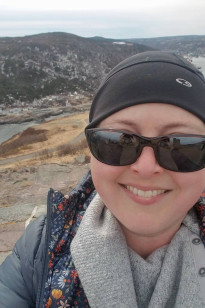

| Degree | Program | University |
|---|---|---|
| Ph.D. | Biology | University of South Carolina |
| B.A. | Biology | University of Chicago |
My Siena Experience
My Teaching Philosophy
It is easy to think about biology as a discipline of facts, forgetting that facts are only useful when they are applied. Students in my courses practice using and applying their biological knowledge through problem solving, data analysis, experimental design, and critical writing. My goals are to foster students' life-long interest in the biological world surrounding us, prepare them to be citizens of that world, and help advance their expertise in the learning, thinking, and communicating skills that will serve them throughout their lives.
What I Love About Siena
I love Siena students -- they are inquisitive, fun, and hardworking, and kind. They remind me every day why I wanted to become a college professor.
My Favorite Courses to Teach
I teach Biostatistics, Invertebrate Biology, General Biology, Science Writing, and Marine Ecology. I don't think I could choose a favorite -- I love them all in different ways.
My Professional Experience
| Year | Title | Organization |
|---|---|---|
| 2018 - Now | Associate Professor of Biology | Siena College |
| 2012 - 2018 | Assistant Professor of Biology | Siena College |
| 2009 - 2012 | Postdoctoral Scholar | University of Chicago |
| 2008 - 2009 | Postdoctoral Fellow | Smithsonian Environmental Research Center |
Current Research
As an ecologist, I care about what organisms do. Every phenotype has myriad effects--on the individual, on the systems in which it participates, and on the evolutionary fate of its lineage. Understanding how functional traits operate across these scales is at the core of my work. From crabs to worms to clams; from individual growth to size distributions of global faunas; from manipulative field experiments to database-oriented statistical modeling, I work in varied systems using varied approaches.Current projects include (i) understanding how an invasive alga is affecting coastal invertebrates in the Eastern United States and (ii) using marine bivalves as a model system for understanding global patterns in biodiversity.
See more at my personal website: https://sites.google.com/siena.edu/dr-berke/home
Articles & Book Reviews
- A review of Diopatra ecology: current knowledge, open questions, and future threats for an ecosystem engineering polychaete
Journal is not in list - being petitioned
2022 - Oil disturbance reduces infaunal family richness but does not affect phylogenetic diversity
Journal is not in list - being petitioned, vol. 1154
2022 - Shallow infaunal responses to the Deepwater Horizon event: implications for studying future oil spills
Journal is not in list - being petitioned, vol. 1179
2022 - Student‐led field studies of herbivory: Hands‐on experiences for remote (or in‐person) learning
Invertebrate Biology, vol. 140
2021 - A double-edged sword: infaunal responses to Gracilaria vermiculophylla in the mid-Atlantic United States
Estuaries and Coasts, vol. 42
2020 - Grazer interactions with invasive Agarophyton vermiculophyllum (Rhodophyta): comparisons to related vs. unrelated native alga
Biological Bulletin, vol. 238
2020 - Sublethal effects of oil exposure on infaunal behavior, bioturbation, and sediment oxygen demand
Marine Ecology Progress Series, vol. 635
2020 - Climate hindcasts: exploring the disjunct distribution of Diopatra biscayensis.
Integrative and Comparative Biology, vol. 135
2016 - Non-linear climatic gradients shape broad-scale patterns in geographic range size and diversity.
Global Ecology and Biogeography, vol. 24
2015 - Origination and migration drive latitudinal gradients in marine functional diversity
PLoS ONE, vol. 9
2014 - Beyond Bergmann's Rule: size-latitude relationships in marine Bivalvia worldwide
Global Ecology and Biogeography, vol. 22
2013 - Out of the tropics, but how? Fossils, bridge species, and thermal ranges in the dynamics of the marine latitudinal diversity gradient
PNAS, vol. 110
2013 - The sampling and estimation of marine paleodiversity patterns: implications of a Pliocene model
Paleobiology, vol. 39
2013 - Biogeographic variability in the abundance, behavior, and ecosystem engineering of the tube-building polychaete Diopatra cuprea (Bosc)
Marine Ecology Progress Series, vol. 447
2012 - Diopatra (Onuphidae: Polychaeta) from intertidal sediments in Southwestern Europe
Zootaxa, vol. 3395
2012 - Global environmental predictors of benthic marine biogeographic structure
PNAS, vol. 109
2012 - Functional groups of ecosystem engineers: a proposed classification with comments on current issues
Integrative and Comparative Biology, vol. 50
2010 - Range shifts and species diversity in marine ecosystem engineers: patterns and predictions for European sedimentary habitats
Global Ecology and Biogeography, vol. 19
2010 - Behavioral and morphological aspects of decorating in Oregonia gracilis (Brachyura: Majoidea)
Invertebrate Biology, vol. 238
2009 - Sublethal predation in ecosystem engineering polychaetes
Biological Bulletin, vol. 217
2009 - Energetic costs, ontogenetic shifts and sexual dimorphism in decorator crabs
Functional Ecology, vol. 22
2008 - Tube decoration may not be cryptic for Diopatra cuprea Bosc (Polychaeta: Onuphidae)
Biological Bulletin, vol. 214
2008 - Modelling the energy-mortality tradeoffs of invertebrate decorating behaviour
Evolutionary Ecology Research, vol. 8
2006 - Reversion of the glycopeptide resistance phenotype in Staphylococcus aureus clinical isolates
Antimicrobial Agents and Chemotherapy, vol. 44
2000
Presentations
- Teaching about teaching: Sally Woodin's legacy in biology education
January, 2015
Society of Integrative and Comparative Biology Annual Meeting, West Palm Beach, Florida - Epifaunal and infaunal community responses to an invasive species
2015
Society of Integrative and Comparative Biology Annual Meeting, West Palm Beach, Florida - Interactions between invasive algae and native invertebrates in Virginia's coastal bays
2015
Invited professional lectures/symposia: Mt Holyoke College, Mt. Holyoke, Massachusetts - A regime shift in progress? New effects of an invasive alga in Virginia's coastal bays
January, 2014
Society of Integrative and Comparative Biology Annual Meeting, Austin, Texas - Algal showdown: invasive Gracilaria vermiculophylla vs. native species in Virginia's coastal bays
January, 2014
Society of Integrative and Comparative Biology Annual Meeting, Austin, Texas - Does oceanography constrain marine bivalve invasions?
2013
Society of Integrative and Comparative Biology Annual Meeting, Salt Lake City, Utah